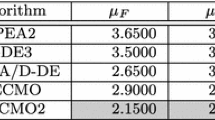Abstract
A novel fitness sharing method for MOGA (Multi-Objective Genetic Algorithm) is proposed by combining a new sharing function and sided degradations in the sharing process, with preference to either of two close solutions. The modified MOGA adopting the new sharing approach is named as MOGAS. Three different variants of MOGAS are tested; MOGASc, MOGASp and MOGASd, favoring children over parents, parents over children and solutions closer to the ideal point, respectively. The variants of MOGAS are compared with MOGA and other state-of-the-art multi-objective evolutionary algorithms such as IBEA, HypE, NSGA-II and SPEA2. The new method shows significant performance improvements from MOGA and is very competitive against other Evolutionary Multi-objective Algorithms (EMOAs) for the ZDT and DTLZ test functions with two and three objectives. Among the three variants MOGASd is found to give the best results for the test problems.
Similar content being viewed by others
References
Fonseca, C.M., Fleming, P.J.: Genetic algorithms for multi-objective optimization: formulation, discussion, and generalization. In: Proceedings of the Fifth International Conference on Genetic Algorithms, pp. 416–423 (1993)
Deb, K., Agrawal, S., Pratap, A., Meyarivan, T.: A fast elitist non-dominated sorting genetic algorithm for multi-objective optimization: NSGA-II. In: Proceedings of the Parallel Problem Solving from Nature VI (PPSN_VI), pp. 849–858 (2000)
Zitzler, E., Laumanns, M., Thiele, L.: SPEA2: improving the strength pareto evolutionary algorithms. TIK report 103, Computer Engineering and Networks Laboratory (TIK), Department of Electrical Engineering, Swiss Federal Institute of Technology (ETH) Zurich, May (2001)
Deb, K., Mohan, M., Mishra, S.: A fast multi-objective evolutionary algorithms for finding well-spread pareto-optimal solutions, KanGAL Report 2003002, Indian Institute of Technology, Kanpur, India (2003)
Zitzler E., Kunzli S. et al.: Indicator-Based Selection in Multi-objective Search. In: Yao, X. (ed.) 8th Int’l Conference on Parallel Problem Solving from Nature (PPSN VIII), pp. 832–842. Springer, UK (2004)
Bader, J., Zitzler, E.: HypE: an algorithm for fast hypervolume-based many-objective optimization. TIK report 286, Computer Engineering and Networks Laboratory (TIK), Department of Electrical Engineering, Swiss Federal Institute of Technology (ETH) Zurich, Switzerland, November (2008)
Beume N., Naujoks B., Emmerich M.: SMS-EMOA: multi-objective selection based on dominated hypervolume. Eur. J. Oper. Res. 181(3), 1653–1669 (2007)
Wagner T., Beume N., Naujoks B.: Pareto- Aggregation-, and Indicator-based Methods in Many-Objective Optimization, Evolutionary Multi-Criterion Optimization. Springer, Berlin (2007)
Goldberg, D.E., Richardson, J.: Genetic algorithms with sharing for multimodal function optimization. In: Proceedings of the First International Conference on Genetic Algorithms and Their Applications, pp. 41–49 (1987)
Knowles J.D., Corne D.W.: Approximating the nondominated front using the pareto archive evolutionary strategy. Evol. Comput. 8(2), 149–172 (2000)
CoelloCoello Carlos A., Lamont G.B., Van Veldhuizen D.A.: Evolutionary Algorithms for Solving Multi-Objective Problems, pp. 109. Springer, Berlin (2007)
Deb K.: Multi-Objective Optimization Using Evolutionary Algorithms, pp. 206–207. Wiley, New York (2001)
Baker, J.E.: Reducing bias and inefficiency in the selection algorithm. In: Grefenstette, J.J. (ed.) Proceedings of the Second International Conference on Genetic Algorithms, Lawrence Erlbaum Associates, pp. 14–21 (1987)
Deb K., Agrawal R.B.: Simulated binary crossover for continuous search space. Complex Syst. 9(2), 115–148 (1995)
Deb K., Goyal M.: A combined genetic adaptive search (GeneAS) for engineering design. Comput. Sci. Inform. 26(4), 30–45 (1996)
Bleuler, S., Laumanns, M., Thiele, L., Zitzler, E.: PISA—a platform and programming language independent interface for search algorithms. In: Fonseca, C.M., Fleming, P.J., Zitzler, E., Deb, K., Thiele, L. (eds.) Evolutionary Multi-Criterion Optimization, pp. 494–508. Springer, Berlin (2003)
Coello C.A.C., Pulido G.T., Montes E.M.: Current and Future Research Trends in Evolutionary Multi-objective Optimization, Information Processing with Evolutionary Algorithms: from Industrial Applications to Academic Speculations, pp. 213–231. Springer, London (2005)
Obayashi S., Sasaki D., Takeguchi Y., Hirose N.: Multi-objective evolutionary computation for supersonic wing-shape optimization. IEEE Trans. Evol. Comput. 4(2), 182–187 (2000)
Kanazaki, M., Obayashi, S., Nakahashi, K.: Design optimization of exhaust manifold for a car engine using MOGA. Presented at EUROGEN2001, Athens, September. In: Giannakoglou, K., Tsahalis, D., Periaux, J., Papailiou K., Fogarty T. (eds.) Evolutionary Methods for Design, Optimisation and Control, c CIMNE, Barcelona (2002)
Lopex-ibanez M., Knowles J., Laumanns M. et al.: On Sequential Online Archving of Objective Vectors. In: Takahashi, R. (ed.) Evolutionary Multi-criterion Optimization (EMO 2011) volume 6576 of Lecture Notes in Computer Science, pp. 46–60. Springer, Heidelberg (2011)
Zitzler E., Deb K., Thiele L.: Comparison of multi-objective evolutionary algorithms: empirical results. Evol. Comput. J. 8(2), 125–148 (2000)
Deb K., Thiele L., Laumanns M., Zitzler E.: Scalable Test Problems for Evolutionary Multi-Objective Optimization. In: Abraham, A., Jain, R., Goldberg, R. (eds.) Evolutionary Multi-objective Optimization: Theoretical Advances and Applications, Chapter 6, pp. 105–145. Springer, Berlin (2005)
Knowles, J., Thiele, L. Zitzler, E.: A tutorial on the performance assessment of stochastic multi-objective optimizers. TIK report 214, Computer Engineering and Networks Laboratory (TIK), Swiss Federal Institute of Technology (ETH) Zurich, Switzerland, February (2006)
Zitzler E., Thiele L., Laumanns M., Fonseca C.M., da Fonseca V.G.: Performance assessment of multi-objective optimizers: an analysis and review. IEEE Trans. Evol. Comput. 7, 117–132 (2003)
Conover W.J.: Practical Nonparametric Statistics, 3rd edn. Wiley, New York (1999)
Author information
Authors and Affiliations
Corresponding author
Rights and permissions
About this article
Cite this article
Kim, H., Liou, MS. New fitness sharing approach for multi-objective genetic algorithms. J Glob Optim 55, 579–595 (2013). https://doi.org/10.1007/s10898-012-9966-4
Received:
Accepted:
Published:
Issue Date:
DOI: https://doi.org/10.1007/s10898-012-9966-4




